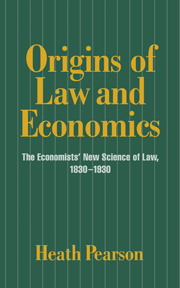5 - The way to oblivion
Published online by Cambridge University Press: 12 January 2010
Summary
It is difficult to measure the true impact of the economists' new science on other disciplines, or on succeeding generations of economists. Much of the problem is that the movement's leitmotifs – institutional evolution, rationalism, materialism, civic virtue – were generally “in the air” at that time. Thus there exists, on the one hand, the danger of neglecting lines of real influence which ran not directly and acknowledged, but rather were mediated through a common, largely anonymous fund of intellectual capital. On the other hand, there stands the converse danger of specious credit, of assigning the new science influence by the mere fact of its correlation with developments elsewhere, when in fact those developments might have proceeded apace even in the hypothetical absence of the economists' contribution.
Our accounting in this chapter will be less ambitious than the “atmospheric” approach, and I hope less prone to error. Insofar as is possible, we shall reason on the basis of things explicitly said of the new science and its practitioners, and to a lesser extent on the basis of conspicuous silences. The new science was not without its admirers; but the weight of evidence in this chapter will point to indifference, verging into open hostility. We will document this fact by examining in sequence several disciplines which were potentially amenable to the new science's approach: history (section I), the “younger” social sciences (sociology, anthropology, etc., in section II), jurisprudence (section III), and economics itself (section IV). Conclusions follow in section V.
The new science approached oblivion via a number of paths. Enumeration of those paths will be a task for the pages to follow.
- Type
- Chapter
- Information
- Origins of Law and EconomicsThe Economists' New Science of Law, 1830–1930, pp. 130 - 161Publisher: Cambridge University PressPrint publication year: 1997



